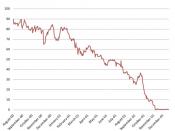To explain the causes of collapse for Enron, you must first examine the company history till its downfall and what it actually did as a company.
Enron was formed in July 1985 form the merger of two large natural gas line companies called Internorth and Houston Natural Gas in the US. The company began trading natural gas commodities in 1989 and electricity in 1994. The company made extensive use of the internet to broker sales and quickly became a powerhouse in the natural gas and electricity markets. Beginning in the mid 1990s the company tried to build upon its earlier success in the energy markets by expanding into other more speculative markets and diversifying into global commodities trading.
The key to understanding Enron's collapse is to know what the company actually did.
The initial product markets in which Enron moved were gas and electricity supply in which they fought hard for deregulation so they could compete further across the US.
This deregulation meant that Enron's initial successes led to a flood of fresh entrants into the field i.e. more competition. This contributed to a reduction in Enron's business margins no mater however efficient Enron's trades were. Declining returns meant its trading margins collapsed and therefore sales growth did not translate into higher profits. This meant that Enron was not as profitable when actually trading specific gas and electricity products. As the asset based markets declined Enron moved to function primarily as a "middleman," buying and selling energy contracts between suppliers and companies that delivered this energy to consumers. It also decided to branch out into water supply and technology networking brokerage i.e. internet band width brokering. This meant that Enron had very few business assets and had to trade upon trust.
The decline in Enron's profits led to its managers adopting special techniques some of them questionable to boost profits in their published accounts. This was done to support Enron's previous track record were gross sales per year had been up to $200bn. This meant Enron's managers came under increasing pressure to sustain their profit margins and to do this they specifically miss stated the profits from asset sales as trading gains.
The reasons why Enron could do this were that it was a most unusual company even when things appeared to be going well. It was acting as a huge, unregulated trading company in effect, an investment bank that escaped all the normal prudential and conduct of business rules. It did this by confining itself to un-regulated markets and was thus not classified as a bank, insurer or fund manager. It went to great lengths to ensure that its trading continued to escape regulation even up to the point of donating huge amounts of money to its political interests in the White House.
This meant that even its auditors, Andersons came in to check Enron's books they were under great pressure for them to read appropriately to financial market expectations. Anderson themselves also had an interest in Enron as they had money invested in them as investment funds e.g. pension funds etc.
The Financial Times reported on the 3rd of February 2002 that:
"Enron inflated revenues, for example by treating the turnover of trading through its online subsidiary as revenue" and that:
"Enron bolstered profits by booking income immediately on contracts that would take up to 10 years to complete. It shifted debts into partnerships it created and in effect controlled, even though defined by auditors as off balance sheet. It used such entities to manipulate its accounts at the end of each quarter and employed financial derivatives and other complex transactions aggressively to the same end. It masked poorly performing assets with rapid deal-making."
According to the FT of the same date "these strategies are used by other large companies but Enron, however, used them more aggressively and comprehensively than most to create the image of a dynamic corporation with lower debt, higher revenues and bigger profits than justified by its businesses."
This meant that Enron's share price over time became over inflated until Enron's reports of a $1.2bn charge against equity that it had skipped over in its third quarter results briefing. This after all the trouble they had had with their deals in India to pull out of the $2.9bn Dabhol Power project near Bombay. This left investors scared which meant that their stock prices fell rapidly.
The erratic prices at the beginning of the Jan 2000 - Feb 2001 show the stock being sold by its main executives before the financial collapse of the company and the reported profits being released at the end of July 2000.
The demand for the Enron's shares before any of the news of their financial difficulty was very high. This meant that market price for the share had been pushed up as potential investors thought it was a good long term investment with a strong future. The price thus rose from P1 too P2 whilst supply remained the same. This is illustrated below in Fig 1.1
The demand fell rapidly after the market realised that the company had been misrepresenting their profits as shown in fig 2.2. This meant there were a large number of shares on the market that no one wanted thus forcing the price down.
This shows that as good news was reported the share price rose as people believed future dividends in the company would be large and they would therefore gain financially but as it was proved a failing company the share holders 'dumped' their stock to try to recoup the best possible price for their shares.
It could be argued that the markets in which Enron operated failed to work effectively because they did not recognise the problems brewing at Enron. The markets should have been more highly regulated to protect investors from this type of aggressive accounting with auditors not being able to have interests/ partnerships in the companies they audit.
The market also did not recognise that Enron were in a market were growth was slow and competition was growing, so they should have asked more questions such as 'how could they be registering such high profits in low growth areas?'
The main point about the markets is that they had too much trust in the people they invested in and that they were willing to believe that everything was great even when the cracks began to appear in the company.
Another relevant comment is that Enron was felled by the very market forces for whose dominance it strove heroically. Enron with its reputed political linkages extending up to the White House was able to enforce deregulation of energy markets. But these very market forces led to its demise when the signs of trouble came up.
The consequences for the US economy as a result of this crisis have not been as great as expected in the markets in which they operated as following the company's collapse it appeared that the electricity and gas traders were not affected. In actual fact there it was reported by the FT again that:
"The disappearance of a huge participant might have been expected to have a big impact on US energy markets. Yet the lights stayed on, the gas continued to flow. Because they were professional- to-professional markets, there was no damaging impact on consumers."
This was because the companies involved (including those at Enron) worked hard to unwind various deals involving Enron and also to find other parties to complete the transactions. Their single retail utility asset of Enron, Portland General Electric, was fully protected by Oregon state regulators, and its residential customers did not experience any disruption of service.
On the other hand the major financial institutions involved with Enron as partnerships have suffered a lot. For instance Anderson's the auditor of Enron have gone into financial receivership and are currently being pursued by KPMG which means there are no longer a 'big five' accounting companies but four. As for Enron they have left nearly 15,000 people worldwide without jobs and have jolted US and European governmental departments to take another look at the deregulation of industries. This means that in future such companies would have to have a more transparent accounting practice which in the long term should lead to safer investments in such large global players.



Dynegy Energy Corp and Bush's government relations with Enron
i could not see this in the essay but Enron tried to merge with Dynegy , another energy company at one point. Maybe we would not find about Enron if the merger deal was a success.
Let's not forget the highly media covered Bush's governments ties to Enron such as VP Dick Cheney.
In the end thousand of Enron employees lost their 401k plans which was driven by the Enron stock.
Speaking of financial firms lossesin the essay ; JP Morgan lost hundreds of million dollars in lines of credit. besides financials JP Morgan lost it's reputation as well.
More can be found regarding JP Morgan's losses by following the link below:
http://www.iht.com/articles/2002/03/30/men ron_ed3_.php
0 out of 0 people found this comment useful.